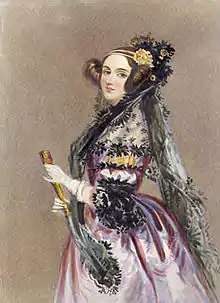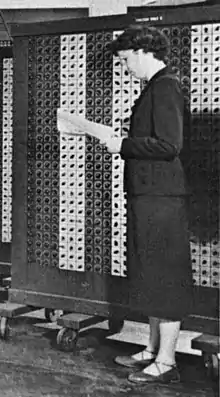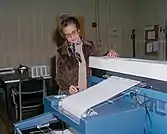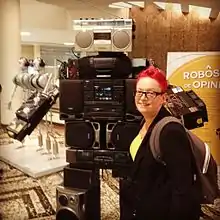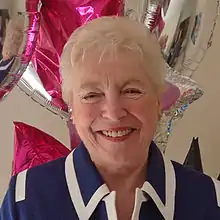Timeline of women in computing
This is a timeline of women in computing. It covers the time when women worked as "human computers" and then as programmers of physical computers. Eventually, women programmers went on to write software, develop Internet technologies and other types of programming. Women have also been involved in computer science, various related types of engineering and computer hardware.
Women pioneers in computing. Clockwise from top left: Ada Lovelace, Betty Holberton, Radia Perlman, Sue Black, Audrey Tang, Katherine Johnson.
| Part of a series on |
| Women in society |
|---|
 |
18th century
1757
 Nicole-Reine Etable de la Brière Lepaute worked on a team of human computers to determine the next visit of Halley's Comet.[1][2] The methods they developed have been used by successive human computing teams.[3]
Nicole-Reine Etable de la Brière Lepaute worked on a team of human computers to determine the next visit of Halley's Comet.[1][2] The methods they developed have been used by successive human computing teams.[3]
19th century
1842
 Ada Lovelace was an analyst of Charles Babbage's analytical engine and is considered by many the "first computer programmer."[4][5]
Ada Lovelace was an analyst of Charles Babbage's analytical engine and is considered by many the "first computer programmer."[4][5]
1849
 Maria Mitchell is hired by the U.S. Nautical Almanac Office to work as a computer on tables for the planet Venus.[6]
Maria Mitchell is hired by the U.S. Nautical Almanac Office to work as a computer on tables for the planet Venus.[6]
1875
 Anna Winlock joined the Harvard computers, a group of women engaged in the production of astronomical data at Harvard.[7]
Anna Winlock joined the Harvard computers, a group of women engaged in the production of astronomical data at Harvard.[7]
1893
 Henrietta Swan Leavitt joined the Harvard "computers". She was instrumental in discovery of the cepheid variable stars, which are evidence for the expansion of the universe.[8]
Henrietta Swan Leavitt joined the Harvard "computers". She was instrumental in discovery of the cepheid variable stars, which are evidence for the expansion of the universe.[8]
20th century
1916
 Beatrice Cave-Brown-Cave went to work as a human computer for the Ministry of Munitions.[9]
Beatrice Cave-Brown-Cave went to work as a human computer for the Ministry of Munitions.[9]
1918
 Women were hired to do ballistics calculations as human computers in Washington, D.C.[10] The "chief computer" of the group was Elizabeth Webb Wilson.[11]
Women were hired to do ballistics calculations as human computers in Washington, D.C.[10] The "chief computer" of the group was Elizabeth Webb Wilson.[11]
1920
 Mary Clem leads the computing lab at Iowa State College.[12][13]
Mary Clem leads the computing lab at Iowa State College.[12][13]
1921
 Edith Clarke files a patent for a graphical calculator for problem solving electric power line transmission problems.[14]
Edith Clarke files a patent for a graphical calculator for problem solving electric power line transmission problems.[14]
1926
 Grete Hermann published the foundational paper for computerized algebra. It was her doctoral thesis, titled "The Question of Finitely Many Steps in Polynomial Ideal Theory", and published in Mathematische Annalen.[15]
Grete Hermann published the foundational paper for computerized algebra. It was her doctoral thesis, titled "The Question of Finitely Many Steps in Polynomial Ideal Theory", and published in Mathematische Annalen.[15]
1935
 The National Advisory Committee for Aeronautics (NACA) which became NASA, hired a group of five women to work in their computer pool analyzing data from wind tunnels and flight tests.[16]
The National Advisory Committee for Aeronautics (NACA) which became NASA, hired a group of five women to work in their computer pool analyzing data from wind tunnels and flight tests.[16]
1939
 The Austrian Johanna Piesch published two pioneering papers on switching algebra.[17]
The Austrian Johanna Piesch published two pioneering papers on switching algebra.[17]
1940
 American women were recruited to do ballistics calculations and program computers during WWII. Around 1943–1945, these women "computers" used a differential analyzer in the basement of the Moore School of Electrical Engineering to speed up their calculations, though the machine required a mechanic to be totally accurate and the women often rechecked the calculations by hand.[18] Phyllis Fox ran a differential analyzer single-handedly, with differential equations as her program specification.
American women were recruited to do ballistics calculations and program computers during WWII. Around 1943–1945, these women "computers" used a differential analyzer in the basement of the Moore School of Electrical Engineering to speed up their calculations, though the machine required a mechanic to be totally accurate and the women often rechecked the calculations by hand.[18] Phyllis Fox ran a differential analyzer single-handedly, with differential equations as her program specification.
1941
 Mavis Batey broke the Italian Naval code while working at Bletchley Park.[19]
Mavis Batey broke the Italian Naval code while working at Bletchley Park.[19] The United States begins recruiting African-American college graduates to work at Langley Air Force Base as human computers.[20]
The United States begins recruiting African-American college graduates to work at Langley Air Force Base as human computers.[20]
1942
 On 11 August, Hedy Lamarr and co-inventor, George Antheil, received their patent for frequency hopping.[21]
On 11 August, Hedy Lamarr and co-inventor, George Antheil, received their patent for frequency hopping.[21]
1943

 Women worked as WREN Colossus operators during WW2 at Bletchley Park.[22]
Women worked as WREN Colossus operators during WW2 at Bletchley Park.[22] Wives of scientists working on the Manhattan Project with mathematical training were hired as human computers to work on the ENIAC and MANIAC I computers.[23] This included Klara Dan von Neumann, Augusta H. Teller, and Adele Goldstine.[24][25]
Wives of scientists working on the Manhattan Project with mathematical training were hired as human computers to work on the ENIAC and MANIAC I computers.[23] This included Klara Dan von Neumann, Augusta H. Teller, and Adele Goldstine.[24][25] Gertrude Blanch led the Mathematical Tables Project group from 1938 to 1948. During World War II, the project operated as a major computing office for the U.S. government and did calculations for the Office of Scientific Research and Development, the Army, the Navy, the Manhattan Project and other institutions.[26]
Gertrude Blanch led the Mathematical Tables Project group from 1938 to 1948. During World War II, the project operated as a major computing office for the U.S. government and did calculations for the Office of Scientific Research and Development, the Army, the Navy, the Manhattan Project and other institutions.[26] Ruth Leach Amonette was elected Vice President at IBM, the first woman to hold that role.[27]
Ruth Leach Amonette was elected Vice President at IBM, the first woman to hold that role.[27]
1945
 Marlyn Meltzer is hired as one of the first ENIAC programmers.[14]
Marlyn Meltzer is hired as one of the first ENIAC programmers.[14]
1946
 Betty Jennings, Betty Snyder, Frances Spence, Kay McNulty, Marlyn Wescoff, and Ruth Lichterman were the regularly working programmers of the ENIAC. Adele Goldstine, also involved in the programming, wrote the program manual for the ENIAC.[28]
Betty Jennings, Betty Snyder, Frances Spence, Kay McNulty, Marlyn Wescoff, and Ruth Lichterman were the regularly working programmers of the ENIAC. Adele Goldstine, also involved in the programming, wrote the program manual for the ENIAC.[28]
1947
 Irma Wyman worked on a missile guidance project at the Willow Run Research Center. To calculate trajectory, they used mechanical calculators. In 1947–48, she visited the U.S. Naval Proving Ground where Grace Hopper was working on similar problems and discovered they were using a prototype of a programmable Mark II computer.[29]
Irma Wyman worked on a missile guidance project at the Willow Run Research Center. To calculate trajectory, they used mechanical calculators. In 1947–48, she visited the U.S. Naval Proving Ground where Grace Hopper was working on similar problems and discovered they were using a prototype of a programmable Mark II computer.[29]
1948
 Kathleen Booth is credited with writing the assembly language for the ARC2 computer.[30]
Kathleen Booth is credited with writing the assembly language for the ARC2 computer.[30] Dorothy Vaughn becomes the first black supervisor at NACA.[20]
Dorothy Vaughn becomes the first black supervisor at NACA.[20]
1949
 Grace Hopper, was a United States Navy officer and one of the first programmers of the Harvard Mark I, known as the "Mother of COBOL". She developed the first compiler for an electronic computer, known as A-0. She also popularized the term "debugging" – a reference to a moth extracted from a relay in the Harvard Mark II computer.[31]
Grace Hopper, was a United States Navy officer and one of the first programmers of the Harvard Mark I, known as the "Mother of COBOL". She developed the first compiler for an electronic computer, known as A-0. She also popularized the term "debugging" – a reference to a moth extracted from a relay in the Harvard Mark II computer.[31] Evelyn Boyd Granville was the second African-American woman in the U.S. to receive a PhD in mathematics. From 1956 to 1960, she worked for IBM on the Project Vanguard and Project Mercury space programs, analyzing orbits and developing computer procedures.[32]
Evelyn Boyd Granville was the second African-American woman in the U.S. to receive a PhD in mathematics. From 1956 to 1960, she worked for IBM on the Project Vanguard and Project Mercury space programs, analyzing orbits and developing computer procedures.[32].svg.png.webp) On 6 May, the EDSAC performs its first calculations using a program written by Beatrice Worsely.[33]
On 6 May, the EDSAC performs its first calculations using a program written by Beatrice Worsely.[33]
1950
 Ida Rhodes was one of the pioneers in the analysis of systems of programming. She co-designed the C-10 language in the early 1950s for the UNIVAC I – a computer system that was used to calculate the census.[34]
Ida Rhodes was one of the pioneers in the analysis of systems of programming. She co-designed the C-10 language in the early 1950s for the UNIVAC I – a computer system that was used to calculate the census.[34] Kathleen Booth creates Assembly Language.[35]
Kathleen Booth creates Assembly Language.[35]
1951
 Frances Elizabeth "Betty" Snyder develops a UNIVAC program, the first sort-merge generator.[36]
Frances Elizabeth "Betty" Snyder develops a UNIVAC program, the first sort-merge generator.[36]
1952
 Mary Coombs was one of the first programmers on, and was the first female programmer on LEO, the first business computer. She went on to work on LEO II and LEO III.[37]
Mary Coombs was one of the first programmers on, and was the first female programmer on LEO, the first business computer. She went on to work on LEO II and LEO III.[37] Hungarian-born Klara Dan von Neumann pioneers the programming of MANIAC I.[38]
Hungarian-born Klara Dan von Neumann pioneers the programming of MANIAC I.[38].svg.png.webp) Canadian, Beatrice Worsley, completes her doctorate in computer science, becoming the first woman to earn that degree.[39]
Canadian, Beatrice Worsley, completes her doctorate in computer science, becoming the first woman to earn that degree.[39]
1954

 Thelma Estrin works on Israel's first computer, the WEIZAC.[40]
Thelma Estrin works on Israel's first computer, the WEIZAC.[40]
1955
 Annie Easley starts working as a human computer for NACA.[41]
Annie Easley starts working as a human computer for NACA.[41]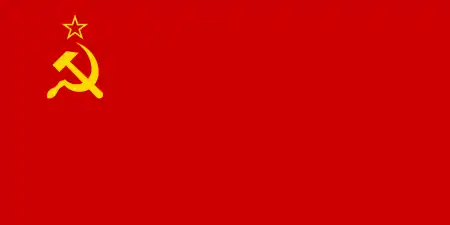 Kateryna Yushchenko creates the Address programming language.[35]
Kateryna Yushchenko creates the Address programming language.[35]
1958
 Orbital calculations for the United States' Explorer 1 satellite were solved by the NASA Jet Propulsion Laboratory's all-female "computers", many of whom were recruited out of high school. Mechanical calculators were supplemented with logarithmic calculations performed by hand.[42][43]
Orbital calculations for the United States' Explorer 1 satellite were solved by the NASA Jet Propulsion Laboratory's all-female "computers", many of whom were recruited out of high school. Mechanical calculators were supplemented with logarithmic calculations performed by hand.[42][43] Grace Hopper designs the computer language, FLOWMATIC.[21]
Grace Hopper designs the computer language, FLOWMATIC.[21] 5 May, Langley desegregates, closing down the West Area Computers.[44]
5 May, Langley desegregates, closing down the West Area Computers.[44] Kathleen Booth publishes a book about programming APE(X)C computers.[45]
Kathleen Booth publishes a book about programming APE(X)C computers.[45]
1959
 Mary K. Hawes convenes a meeting to discuss specifications for a business programming language.[14] This would lead to the creation of COBOL.[14]
Mary K. Hawes convenes a meeting to discuss specifications for a business programming language.[14] This would lead to the creation of COBOL.[14]
1961
 Dana Ulery was the first female engineer at Jet Propulsion Laboratory, developing real-time tracking systems using a North American Aviation Recomp II, a 40-bit word size computer.[46]
Dana Ulery was the first female engineer at Jet Propulsion Laboratory, developing real-time tracking systems using a North American Aviation Recomp II, a 40-bit word size computer.[46]
1962
 Jean E. Sammet developed the FORMAC programming language. She was also the first to write extensively about the history and categorization of programming languages in 1969, and became the first female president of the Association for Computing Machinery in 1974.[47]
Jean E. Sammet developed the FORMAC programming language. She was also the first to write extensively about the history and categorization of programming languages in 1969, and became the first female president of the Association for Computing Machinery in 1974.[47] Dame Stephanie "Steve" Shirley founded the UK software company F.I. She was concerned with creating work opportunities for women with dependents, and predominantly employed women, only 3 out of 300-odd programmers were male, until that became illegal. She adopted the name "Steve" to help her in the male-dominated business world. From 1989 to 1990, she was president of the British Computer Society. In 1985, she was awarded a Recognition of Information Technology Award.[48]
Dame Stephanie "Steve" Shirley founded the UK software company F.I. She was concerned with creating work opportunities for women with dependents, and predominantly employed women, only 3 out of 300-odd programmers were male, until that became illegal. She adopted the name "Steve" to help her in the male-dominated business world. From 1989 to 1990, she was president of the British Computer Society. In 1985, she was awarded a Recognition of Information Technology Award.[48]
1964
 Joan Ball was the first person to start a computer dating service in 1964.[49]
Joan Ball was the first person to start a computer dating service in 1964.[49] Sharla Boehm performed pioneering work in packet switching.[50]
Sharla Boehm performed pioneering work in packet switching.[50]
1965
 Mary Allen Wilkes was the first person to use a computer in a private home (in 1965) and the first developer of an operating system (LAP) for the first minicomputer (LINC).[51]
Mary Allen Wilkes was the first person to use a computer in a private home (in 1965) and the first developer of an operating system (LAP) for the first minicomputer (LINC).[51] Sister Mary Kenneth Keller became the first American woman to earn a Ph.D. in Computer Science in 1965.[52] Her thesis was titled "Inductive Inference on Computer Generated Patterns."[53]
Sister Mary Kenneth Keller became the first American woman to earn a Ph.D. in Computer Science in 1965.[52] Her thesis was titled "Inductive Inference on Computer Generated Patterns."[53]
1966
 Margaret R. Fox was appointed Chief of the Office of Computer Information in 1966, part of the Institute for Computer Science and Technology of NBS. She held the post until 1975. She was also actively involved in the Association for Computing Machinery (ACM) and served as the first Secretary for the American Federation of Information Processing Societies (AFIPS).[54]
Margaret R. Fox was appointed Chief of the Office of Computer Information in 1966, part of the Institute for Computer Science and Technology of NBS. She held the post until 1975. She was also actively involved in the Association for Computing Machinery (ACM) and served as the first Secretary for the American Federation of Information Processing Societies (AFIPS).[54]
1968
 Vera Molnár is one of the pioneers of computer and algorithmic arts. In 1968 she began working with computers, where she began to create algorithmic drawings based on simple geometric shapes geometrical themes.
Vera Molnár is one of the pioneers of computer and algorithmic arts. In 1968 she began working with computers, where she began to create algorithmic drawings based on simple geometric shapes geometrical themes.
1969
 Jean E.Sammet publishes Programming Languages: History and Fundamentals, which was the standard in the field at the time.[55]
Jean E.Sammet publishes Programming Languages: History and Fundamentals, which was the standard in the field at the time.[55] Margaret Hamilton was in late 1960s Director of the Software Engineering Division of the MIT Instrumentation Laboratory, which developed on-board flight software for the Apollo space program. MIT work prevented an abort of the Apollo 11 moon landing by using robust architecture. Later, she was awarded the NASA Exceptional Space Act Award for her scientific and technical contributions.[56][57][58]
Margaret Hamilton was in late 1960s Director of the Software Engineering Division of the MIT Instrumentation Laboratory, which developed on-board flight software for the Apollo space program. MIT work prevented an abort of the Apollo 11 moon landing by using robust architecture. Later, she was awarded the NASA Exceptional Space Act Award for her scientific and technical contributions.[56][57][58] Alexandra Illmer Forsythe is a co-author of the first computer science textbook, Computer Science: A First Course (Wiley & Sons).[14]
Alexandra Illmer Forsythe is a co-author of the first computer science textbook, Computer Science: A First Course (Wiley & Sons).[14]
1970
 Drude Berntsen is appointed director of the Norwegian Computing Center.[59]
Drude Berntsen is appointed director of the Norwegian Computing Center.[59]
1971
 Erna Schneider Hoover is an American mathematician notable for inventing a computerized telephone switching method which developed modern communication according to several reports.[60] At Bell Laboratories, where she worked for over 32 years, Hoover was described as an important pioneer for women in the field of computer technology.[61]
Erna Schneider Hoover is an American mathematician notable for inventing a computerized telephone switching method which developed modern communication according to several reports.[60] At Bell Laboratories, where she worked for over 32 years, Hoover was described as an important pioneer for women in the field of computer technology.[61] Margaret Burnett became the first woman software developer ever hired by Procter & Gamble/Ivorydale, a 13,000-employee complex that included their R&D center. Her position as a software developer also made her the first woman ever hired into a management-level position there.
Margaret Burnett became the first woman software developer ever hired by Procter & Gamble/Ivorydale, a 13,000-employee complex that included their R&D center. Her position as a software developer also made her the first woman ever hired into a management-level position there.
1972
 Mary Shaw became the first woman to earn a Ph.D. in Computer Science from Carnegie Mellon University.[62]
Mary Shaw became the first woman to earn a Ph.D. in Computer Science from Carnegie Mellon University.[62] Adele Goldberg was one of developers of the Smalltalk language.[63]
Adele Goldberg was one of developers of the Smalltalk language.[63] Karen Spärck Jones was one of the pioneers of information retrieval and natural language processing.[64]
Karen Spärck Jones was one of the pioneers of information retrieval and natural language processing.[64] Sandra Kurtzig founded ASK Computer Systems, an early Silicon Valley startup, on a $20,000 budget.[65]
Sandra Kurtzig founded ASK Computer Systems, an early Silicon Valley startup, on a $20,000 budget.[65]
1973
 Susan Nycum co-authored Computer Abuse, a minor classic that was one of the first studies to define and document computer-related crime.[66][67]
Susan Nycum co-authored Computer Abuse, a minor classic that was one of the first studies to define and document computer-related crime.[66][67] Phyllis Fox worked on the PORT portable mathematical/numerical library.[68]
Phyllis Fox worked on the PORT portable mathematical/numerical library.[68]
1974
 Elizabeth Feinler and her team defined a simple text file format for Internet host names.[69] The list evolved into the Domain Name System and her group became the naming authority for the top-level domains of .mil, .gov, .edu, .org, and .com.
Elizabeth Feinler and her team defined a simple text file format for Internet host names.[69] The list evolved into the Domain Name System and her group became the naming authority for the top-level domains of .mil, .gov, .edu, .org, and .com.
1975
 Irene Greif became the first woman to earn a Ph.D. in computer science from the Massachusetts Institute of Technology.[70]
Irene Greif became the first woman to earn a Ph.D. in computer science from the Massachusetts Institute of Technology.[70]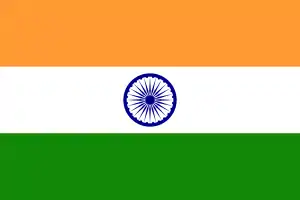 Indian computer scientist Sudha Murthy is hired as first woman to work for TELCO as an engineer.[71]
Indian computer scientist Sudha Murthy is hired as first woman to work for TELCO as an engineer.[71]
1976
 Rózsa Péter publishes Recursive Functions in Computer Theory, a topic she had been working on since the 1950s.[14]
Rózsa Péter publishes Recursive Functions in Computer Theory, a topic she had been working on since the 1950s.[14]
1978
 Sophie Wilson is a British computer scientist. She is known for designing the Acorn Micro-Computer, as well as the instruction set of the ARM processor.[72]
Sophie Wilson is a British computer scientist. She is known for designing the Acorn Micro-Computer, as well as the instruction set of the ARM processor.[72]- The Association for Women in Computing (AWC) is founded.[73]
 Christiane Floyd becomes the first woman to work as a computer science professor in Germany.[74][75]
Christiane Floyd becomes the first woman to work as a computer science professor in Germany.[74][75]
1979
 Lynn Conway co-authored Introduction to VLSI Systems, a bestselling very-large-scale integration (VLSI) design textbook that triggered the Mead & Conway revolution in integrated circuit design.
Lynn Conway co-authored Introduction to VLSI Systems, a bestselling very-large-scale integration (VLSI) design textbook that triggered the Mead & Conway revolution in integrated circuit design. Patricia Selinger was one of the key architects of IBM System R, and in 1979 wrote the canonical paper on relational query optimization. She was appointed an IBM Fellow in 1994, and an ACM Fellow in 2009.
Patricia Selinger was one of the key architects of IBM System R, and in 1979 wrote the canonical paper on relational query optimization. She was appointed an IBM Fellow in 1994, and an ACM Fellow in 2009. Carol Shaw was a game designer and programmer for Atari Corp. and Activision.[76]
Carol Shaw was a game designer and programmer for Atari Corp. and Activision.[76] Ruzena Bajcsy founds the General Robotics, Automation, Sensing and Perception (GRASP) lab at the University of Pennsylvania.[77]
Ruzena Bajcsy founds the General Robotics, Automation, Sensing and Perception (GRASP) lab at the University of Pennsylvania.[77] Priti Shankar does work with generalizing the Bose Chaudhuri-Hocquenghem (BHC) codes for error-correcting.[78]
Priti Shankar does work with generalizing the Bose Chaudhuri-Hocquenghem (BHC) codes for error-correcting.[78]
1980
 Carla Meninsky was the game designer and programmer for Atari 2600 games Star Raiders and Warlords.[79]
Carla Meninsky was the game designer and programmer for Atari 2600 games Star Raiders and Warlords.[79] Gwen Bell starts the Computer Museum to preserve artifacts of computer history.[80]
Gwen Bell starts the Computer Museum to preserve artifacts of computer history.[80] Ruth M. Davis founds Pymatuning Group in Virginia.[81]
Ruth M. Davis founds Pymatuning Group in Virginia.[81]
1982
 Lorinda Cherry worked on the Writer's Workbench (wwb) for Bell Labs.[82]
Lorinda Cherry worked on the Writer's Workbench (wwb) for Bell Labs.[82] Marsha R. Williams becomes the first African American woman to earn a Ph.D. in computer science.[83]
Marsha R. Williams becomes the first African American woman to earn a Ph.D. in computer science.[83]
1983
 Janese Swanson (with others) developed the first of the Carmen Sandiego games. She went on to found Girl Tech. Girl Tech develops products and services that encourage girls to use new technologies, such as the Internet and video games.[84]
Janese Swanson (with others) developed the first of the Carmen Sandiego games. She went on to found Girl Tech. Girl Tech develops products and services that encourage girls to use new technologies, such as the Internet and video games.[84]
1984
 Roberta Williams did pioneering work in graphical adventure games for personal computers, particularly the King's Quest series.[85]
Roberta Williams did pioneering work in graphical adventure games for personal computers, particularly the King's Quest series.[85] Susan Kare created the icons and many of the interface elements for the original Apple Macintosh in the 1980s,[86] and was an original employee of NeXT, working as the Creative Director.[87]
Susan Kare created the icons and many of the interface elements for the original Apple Macintosh in the 1980s,[86] and was an original employee of NeXT, working as the Creative Director.[87] Eleanor K. Baum becomes the first woman in the United States to be named dean of an engineering college.[88]
Eleanor K. Baum becomes the first woman in the United States to be named dean of an engineering college.[88]
1985
 Radia Perlman invented the Spanning Tree Protocol. She has done extensive and innovative research, particularly on encryption and networking. She received the USENIX Lifetime Achievement Award in 2006.[89]
Radia Perlman invented the Spanning Tree Protocol. She has done extensive and innovative research, particularly on encryption and networking. She received the USENIX Lifetime Achievement Award in 2006.[89] Irma Wyman was the first Honeywell CIO.[90]
Irma Wyman was the first Honeywell CIO.[90]- Janet Walker develops the Symbolics Document Examiner.[91]
1986
 Lixia Zhang was the only woman at the initial meetings of the Internet Engineering Task Force.[92]
Lixia Zhang was the only woman at the initial meetings of the Internet Engineering Task Force.[92] Nancy Hafkin heads the Pan African Development Information System.[93]
Nancy Hafkin heads the Pan African Development Information System.[93]
1987
 Monica S. Lam receives a Ph.D. for her work on optimising compilers. She has since then performed influential research in many areas of computer science as well as co-authored a famous textbook on compilers.[94]
Monica S. Lam receives a Ph.D. for her work on optimising compilers. She has since then performed influential research in many areas of computer science as well as co-authored a famous textbook on compilers.[94] Anita Borg founds the electronic mailing list for women in technology, Systers.[95]
Anita Borg founds the electronic mailing list for women in technology, Systers.[95] French computer scientist, Joëlle Coutaz develops the Presentation-abstraction-control model for human computer interactions.[96]
French computer scientist, Joëlle Coutaz develops the Presentation-abstraction-control model for human computer interactions.[96]
1988
 Éva Tardos, is the recipient of the Fulkerson Prize for her research on design and analysis of algorithms.[97]
Éva Tardos, is the recipient of the Fulkerson Prize for her research on design and analysis of algorithms.[97] Janie Tsao co-founds Linksys.[14]
Janie Tsao co-founds Linksys.[14]
1989
 Frances E. Allen became the first female IBM Fellow in 1989. In 2006, she became the first female recipient of the ACM's Turing Award.[98]
Frances E. Allen became the first female IBM Fellow in 1989. In 2006, she became the first female recipient of the ACM's Turing Award.[98] Frances Brazier, professor of Computer Science at the Vrije Universiteit in Amsterdam, is one of the founder of NLnet, the first Internet service provider in the Netherlands.[99]
Frances Brazier, professor of Computer Science at the Vrije Universiteit in Amsterdam, is one of the founder of NLnet, the first Internet service provider in the Netherlands.[99]
1990
 Ruzena Bajcsy becomes the first woman to chair the computer and information science department at the University of Pennsylvania.[77]
Ruzena Bajcsy becomes the first woman to chair the computer and information science department at the University of Pennsylvania.[77]
1992
 Donna Dubinsky CEO and co-founder of Palm, Inc., co-founder of Handspring, co-founder of Numenta, Harvard Business School's Alumni Achievement Award winner for "introducing the first successful personal digital assistant (PDA) and who is now developing a computer memory system modeled after the human brain".[100]
Donna Dubinsky CEO and co-founder of Palm, Inc., co-founder of Handspring, co-founder of Numenta, Harvard Business School's Alumni Achievement Award winner for "introducing the first successful personal digital assistant (PDA) and who is now developing a computer memory system modeled after the human brain".[100] Nancy Rhine and Ellen Pack co-found the first online space targeting women, Women's WIRE.[101][102]
Nancy Rhine and Ellen Pack co-found the first online space targeting women, Women's WIRE.[101][102] Carol Bartz becomes the CEO of Autodesk.[103]
Carol Bartz becomes the CEO of Autodesk.[103]
1993
 Shafi Goldwasser, a theoretical computer scientist, is a two-time recipient of the Gödel Prize for research on complexity theory, cryptography and computational number theory, and the invention of zero-knowledge proofs.[104]
Shafi Goldwasser, a theoretical computer scientist, is a two-time recipient of the Gödel Prize for research on complexity theory, cryptography and computational number theory, and the invention of zero-knowledge proofs.[104] Barbara Liskov together with Jeannette Wing, developed the Liskov substitution principle. Liskov was also the winner of the Turing Prize in 2008.[105]
Barbara Liskov together with Jeannette Wing, developed the Liskov substitution principle. Liskov was also the winner of the Turing Prize in 2008.[105] Carolyn Gruyer writes feminist hypertext, Quibbling.[106]
Carolyn Gruyer writes feminist hypertext, Quibbling.[106]
1994
 Sally Floyd, is known for her work on Transmission Control Protocol.[107]
Sally Floyd, is known for her work on Transmission Control Protocol.[107]- The Grace Hopper Celebration of Women in Computing is first launched by Anita Borg.[108]
- Hi-Pitched Voices, a collaborative hypertext women's writing project is launched in the Hypertext Hotel.[109]
 On 20 April, Hu Qiheng lead the project that installed the first TCP/IP connection to the Internet in China.[110]
On 20 April, Hu Qiheng lead the project that installed the first TCP/IP connection to the Internet in China.[110]
1995
 Mary Lou Jepsen is the CTO of MicroDisplay where she developed smaller computer screens.[21]
Mary Lou Jepsen is the CTO of MicroDisplay where she developed smaller computer screens.[21] Eleanor K. Baum is the first woman to be elected president of the American Society for Engineering Education.[88]
Eleanor K. Baum is the first woman to be elected president of the American Society for Engineering Education.[88]
1996
 Xiaoyuan Tu was the first female recipient of ACM's Doctoral Dissertation Award.[111]
Xiaoyuan Tu was the first female recipient of ACM's Doctoral Dissertation Award.[111]
1997
 Anita Borg, was the founding director of the Institute for Women and Technology (IWT), renamed Anita Borg Institute (ABI) in her honor in 2003.[112]
Anita Borg, was the founding director of the Institute for Women and Technology (IWT), renamed Anita Borg Institute (ABI) in her honor in 2003.[112] Japanese-born Chieko Asakawa develops the IBM Home Page Reader opening up Web resources to the blind.[113]
Japanese-born Chieko Asakawa develops the IBM Home Page Reader opening up Web resources to the blind.[113] Natalya Kaspersky co-founds and heads the highly successful antivirus software company Kaspersky Lab.[114]
Natalya Kaspersky co-founds and heads the highly successful antivirus software company Kaspersky Lab.[114]
 Manuela Veloso is awarded the CMU Allen Newell Medal for Excellence in Research.[14]
Manuela Veloso is awarded the CMU Allen Newell Medal for Excellence in Research.[14]
1998
- The Center for Women and Information Technology (CWIT) is established at the University of Maryland, Baltimore County (UMBC).[115]
 Meg Whitman becomes the CEO of eBay.[14]
Meg Whitman becomes the CEO of eBay.[14]
1999
- LinuxChix, an international organization for women who use Linux and women and men who want to support women in computing, was founded by Deb Richardson.[116]
 Marissa Mayer, was the first female engineer hired at Google, and was later named vice president of Search Product and User Experience. She was formerly the CEO of Yahoo!.
Marissa Mayer, was the first female engineer hired at Google, and was later named vice president of Search Product and User Experience. She was formerly the CEO of Yahoo!. Lixia Zhang coined the term, "middlebox."[117]
Lixia Zhang coined the term, "middlebox."[117] Carly Fiorina starts as the CEO of Hewlett-Packard.[14]
Carly Fiorina starts as the CEO of Hewlett-Packard.[14] Sun Yafeng starts as the chair of Huawei Technologies Board.[14]
Sun Yafeng starts as the chair of Huawei Technologies Board.[14]
21st century
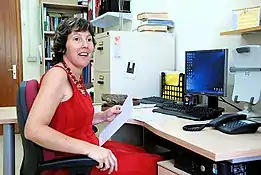
Computer scientist Montse Maritxalar of the University of the Basque Country in 2008.
2000
 Lydia Kavraki is awarded the Grace Murray Hopper Award.[118]
Lydia Kavraki is awarded the Grace Murray Hopper Award.[118]
2001
 Noriko H. Arai started developing NetCommons which is used for content management at over 3,500 educational institutions.[119]
Noriko H. Arai started developing NetCommons which is used for content management at over 3,500 educational institutions.[119]
2003
 Ellen Spertus earned a PhD in Electrical Engineering and Computer Science from MIT in 1998 with the notable thesis "ParaSite: Mining the structural information on the World-Wide Web".[120]
Ellen Spertus earned a PhD in Electrical Engineering and Computer Science from MIT in 1998 with the notable thesis "ParaSite: Mining the structural information on the World-Wide Web".[120] Margaret Hamilton received the NASA Exceptional Space Act Award.[121]
Margaret Hamilton received the NASA Exceptional Space Act Award.[121] Sue Black starts her campaign to preserve Bletchley Park.[122]
Sue Black starts her campaign to preserve Bletchley Park.[122]
2004
 Jeri Ellsworth is a self-taught computer chip designer and creator of the C64 Direct-to-TV.[123]
Jeri Ellsworth is a self-taught computer chip designer and creator of the C64 Direct-to-TV.[123] Lucy Sanders co-founded the National Center for Women & Information Technology[124]
Lucy Sanders co-founded the National Center for Women & Information Technology[124]
 Sara Catz becomes the President of Oracle Corporation.[14]
Sara Catz becomes the President of Oracle Corporation.[14]
2005
 Audrey Tang is the initiator and leader of the Pugs project.[125]
Audrey Tang is the initiator and leader of the Pugs project.[125] Mary Lou Jepsen is the founder and chief technology officer of One Laptop Per Child (OLPC), and the founder of Pixel Qi.[21]
Mary Lou Jepsen is the founder and chief technology officer of One Laptop Per Child (OLPC), and the founder of Pixel Qi.[21] Facebook hires their first woman engineer, Ruchi Sanghvi.[73]
Facebook hires their first woman engineer, Ruchi Sanghvi.[73] Xiaoyun Wang and her team crack the SHA-1 data security algorithm.[126]
Xiaoyun Wang and her team crack the SHA-1 data security algorithm.[126]
2006

.svg.png.webp) Maria Klawe is the first woman to become president of the Harvey Mudd College since its founding in 1955 and was ACM president from 2002 until 2004.[127]
Maria Klawe is the first woman to become president of the Harvey Mudd College since its founding in 1955 and was ACM president from 2002 until 2004.[127] Melanie Rieback's research concerns the security and privacy of Radio Frequency Identification (RFID) technology, she is known to have programmed the first virus to infect RFID devices.[128]
Melanie Rieback's research concerns the security and privacy of Radio Frequency Identification (RFID) technology, she is known to have programmed the first virus to infect RFID devices.[128] Joanna Rutkowska presented Blue Pill, a rootkit based on x86 virtualization, at the Black Hat Briefings computer security conference.[129]
Joanna Rutkowska presented Blue Pill, a rootkit based on x86 virtualization, at the Black Hat Briefings computer security conference.[129] In January, Janet Emerson Bashen, became the first African American woman to hold a patent for a software invention.[130]
In January, Janet Emerson Bashen, became the first African American woman to hold a patent for a software invention.[130] Frances "Fran" Allen becomes the first woman to earn an A.M. Turing Award.[131]
Frances "Fran" Allen becomes the first woman to earn an A.M. Turing Award.[131].svg.png.webp) Sophie Vandebroek becomes the Chief Technology Officer for Xerox.[14]
Sophie Vandebroek becomes the Chief Technology Officer for Xerox.[14] Anne-Marie Kermarrec starts as the Research Director for L'Institut national de recherche en informatique et en automatique (INRIA).[132]
Anne-Marie Kermarrec starts as the Research Director for L'Institut national de recherche en informatique et en automatique (INRIA).[132] Yoelle Maarek opens the Google Haifa Engineering Center where she is the Director.[133]
Yoelle Maarek opens the Google Haifa Engineering Center where she is the Director.[133]
2007

 Meral Özsoyoğlu become the editor-in-chief of the ACM Transactions of Database Systems and is the first woman to hold that position.[134][135]
Meral Özsoyoğlu become the editor-in-chief of the ACM Transactions of Database Systems and is the first woman to hold that position.[134][135]
2008

 Portuguese-born Carla Gomes founds and directs Cornell's Institute for Computational Sustainability.[136]
Portuguese-born Carla Gomes founds and directs Cornell's Institute for Computational Sustainability.[136] Barbara Liskov is the winner of the 2008 A.M. Turing Award.[137]
Barbara Liskov is the winner of the 2008 A.M. Turing Award.[137] The British Computer Society Information Retrieval Specialist Group (BCS IRSG) and the British Computer Society (BCS) create an award in the name of computer scientist, Karen Spärck Jones.[138]
The British Computer Society Information Retrieval Specialist Group (BCS IRSG) and the British Computer Society (BCS) create an award in the name of computer scientist, Karen Spärck Jones.[138]
2009
 Lixia Zhang is awarded an IEEE Internet Award for her "contributions towards developing the Internet's architecture."[117]
Lixia Zhang is awarded an IEEE Internet Award for her "contributions towards developing the Internet's architecture."[117] Carol Bartz joins Yahoo! as CEO.[139]
Carol Bartz joins Yahoo! as CEO.[139]
 Maria Petrou starts as the director of the Informatics and Telematics Institute at Greece's Centre for Research and Technology (CERTH).[140]
Maria Petrou starts as the director of the Informatics and Telematics Institute at Greece's Centre for Research and Technology (CERTH).[140]
2010
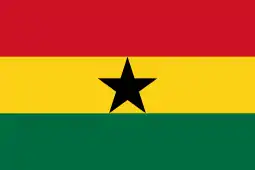 Farida Bedwei co-founds Logiciel in Ghana.[141][142]
Farida Bedwei co-founds Logiciel in Ghana.[141][142]
2011
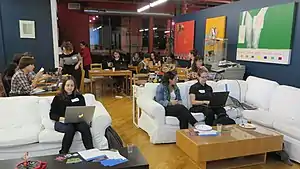
PyLadies of Montreal at a 2015 GitHub party.
- Ladies Learning Code is launched in Toronto.[143]
- PyLadies, an international organization of women interested in coding Python, is started in Los Angeles.[144]
 Meg Whitman becomes CEO of Hewlett-Packard.[14]
Meg Whitman becomes CEO of Hewlett-Packard.[14] Bettina Speckmann is the first winner of the Netherlands Prize for ICT Research where she was recognized for her work on geographic information systems.[145]
Bettina Speckmann is the first winner of the Netherlands Prize for ICT Research where she was recognized for her work on geographic information systems.[145] Noriko H. Arai is the Program director for the artificial intelligence challenge: "Can a robot get into the University of Tokyo?"[119]
Noriko H. Arai is the Program director for the artificial intelligence challenge: "Can a robot get into the University of Tokyo?"[119] Shikoh Gitau is awarded the Google Anita Borg Award, becoming the first person to earn a Google award in Sub Saharan Africa.[146]
Shikoh Gitau is awarded the Google Anita Borg Award, becoming the first person to earn a Google award in Sub Saharan Africa.[146]
2012
 Shafi Goldwasser is a co-recipient of the A.M. Turing Award.[147]
Shafi Goldwasser is a co-recipient of the A.M. Turing Award.[147]- Pixelles hosts their first game-programming incubator in Montreal.[148]
 Computer scientist, Muffy Calder, starts as the Chief Scientific Advisor for the Scottish Government.[149]
Computer scientist, Muffy Calder, starts as the Chief Scientific Advisor for the Scottish Government.[149] Ginni Rometty becomes the first woman to serve as president and CEO of IBM.[14]
Ginni Rometty becomes the first woman to serve as president and CEO of IBM.[14] Eva Tardos earns the Gödel Prize.[97]
Eva Tardos earns the Gödel Prize.[97] Regina Honu founds Soronko Solutions, a software development company in 2012.[150]
Regina Honu founds Soronko Solutions, a software development company in 2012.[150] Carol Reiley is the first woman engineer to be featured on the cover of MAKE magazine.[151][152]
Carol Reiley is the first woman engineer to be featured on the cover of MAKE magazine.[151][152]- Nigerian Women In Information Technology (NiWIIT) was created as an interest group of the Nigeria Computer Society to empower and encourage women working in the field of Information and Communication Technologies.
2013
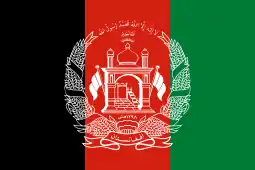 TIME Magazine names Afghani software developer, Roya Mahboob, one of the 100 most influential people of the year.[153]
TIME Magazine names Afghani software developer, Roya Mahboob, one of the 100 most influential people of the year.[153] Christine Paulin-Mohring is awarded the ACM Software System Award for her work on Coq Proof Assistant System.[154]
Christine Paulin-Mohring is awarded the ACM Software System Award for her work on Coq Proof Assistant System.[154]
2014
 Megan Smith named third (and first female) Chief Technology Officer of the United States of America (USCTO), succeeding Todd Park.[155]
Megan Smith named third (and first female) Chief Technology Officer of the United States of America (USCTO), succeeding Todd Park.[155] Coraline Ada Ehmke drafts the first code of conduct for open source projects, the Contributor Covenant.[156]
Coraline Ada Ehmke drafts the first code of conduct for open source projects, the Contributor Covenant.[156] Perianne Boring founded the trade organization and advocacy group Chamber of Digital Commerce in July.[157]
Perianne Boring founded the trade organization and advocacy group Chamber of Digital Commerce in July.[157]- In August, the first Pan-African Women in Tech conference took place online.[158]
2015
 Sarah Sharp is the first winner of the annual Women in Open Source Community Award, awarded by Red Hat.[159]
Sarah Sharp is the first winner of the annual Women in Open Source Community Award, awarded by Red Hat.[159]- Kesha Shah is the first winner of the annual Women in Open Source Academic Award, awarded by Red Hat.[159]
 Gillian Docherty becomes the new CEO of the DataLab in Scotland.[160]
Gillian Docherty becomes the new CEO of the DataLab in Scotland.[160]
2016
 Audrey Tang becomes "digital minister" in Taiwan.[161]
Audrey Tang becomes "digital minister" in Taiwan.[161] Kate Devlin co-organizes the first "sex-tech hackathon" in the UK.[162]
Kate Devlin co-organizes the first "sex-tech hackathon" in the UK.[162] Maja Matarić co-founds Embodied Robotics.[163]
Maja Matarić co-founds Embodied Robotics.[163]
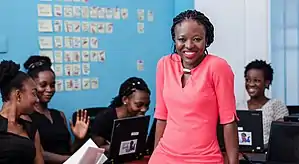
Regina Honu with a classroom of students learning to code.
2017
.svg.png.webp) Michelle Simmons founds the first quantum computer company in Australia.[164]
Michelle Simmons founds the first quantum computer company in Australia.[164] Regina Honu opens Soronko Academy, the first coding and "human centered design school" for both children and teens in West Africa.[165]
Regina Honu opens Soronko Academy, the first coding and "human centered design school" for both children and teens in West Africa.[165]
2018
 Dame Rosie Stephenson-Goodknight was appointed a Knight of the St. Sava Order of Diplomatic Pacifism for her work on Wikipedia.[166]
Dame Rosie Stephenson-Goodknight was appointed a Knight of the St. Sava Order of Diplomatic Pacifism for her work on Wikipedia.[166] Gladys West, a human computer whose calculations helped develop GPS technology, is recognized for her work in December when she is inducted into the Air Force Space and Missile Pioneers Hall of Fame.[167]
Gladys West, a human computer whose calculations helped develop GPS technology, is recognized for her work in December when she is inducted into the Air Force Space and Missile Pioneers Hall of Fame.[167]
References
- Grier 2013, p. 16.
- Grier 2013, p. 20-21.
- Grier 2013, p. 25.
- Fuegi, J.; Francis, J. (2003). "Lovelace & Babbage and the creation of the 1843 'notes'". Annals of the History of Computing. 25 (4): 16–26. doi:10.1109/MAHC.2003.1253887.
- Evans 2018, p. 21.
- "Maria Mitchell". Distinguished Women of Past and Present. Archived from the original on 26 March 2018. Retrieved 17 October 2018.
- Grier 2013, p. 82.
- Hamblin, Jacob Darwin (2005). Science in the early twentieth century : an encyclopedia. Santa Barbara, Calif.: ABC-CLIO. pp. 181–184. ISBN 9781851096657.
- Grier 2013, p. 131.
- Grier 2013, p. 138.
- Grier 2013, p. 139.
- Grier 2013, p. 167.
- Grier 2013, p. 169.
- "Pioneering Women in Computer Technology". The Ada Project. Archived from the original on 26 March 2018. Retrieved 22 November 2018.
- Grete Hermann (1926). "Die Frage der endlich vielen Schritte in der Theorie der Polynomideale". Mathematische Annalen. 95: 736–788. doi:10.1007/bf01206635. S2CID 115897210.
- Atkinson, Joe (24 August 2015). "From Computers to Leaders: Women at NASA Langley". NASA. Retrieved 14 October 2018.
- Lee, J.A.N. "Johanna (Hansi) Piesch". IEEE Computer Society. Retrieved 27 October 2018.
- Gumbrecht, Jamie (8 February 2011). "Rediscovering WWII's female 'computers'". CNN. Archived from the original on 10 May 2012.
- Porzucki, Nina (23 December 2014). "Alan Turing may have cracked Nazi codes, but thousands of women helped". Public Radio International. Retrieved 14 October 2018.
- Blitz, Matt (3 February 2017). "The True Story of 'Hidden Figures' and the Women Who Crunched the Numbers for NASA". Popular Mechanics. Retrieved 18 October 2018.
- Riberio, Ricky (11 May 2012). "Mothers of Technology: 10 Women Who Invented and Innovated in Tech". BizTech. Retrieved 16 October 2018.
- Copeland, Jack B. (2010). Colossus: The Secrets of Bletchley Park's Code Breaking Computers. Oxford University Press.
- Pearson Jr., Willie; Frehill, Lisa M.; McNeely, Connie L.; DiSalvo, Betsy (2015). Advancing Women in Science: An International Perspective. Springer. pp. 265–267. ISBN 9783319086293.
- Howes, Ruth H.; Herzenberg, Caroline L. (2003). Their Day in the Sun: Women of the Manhattan Project. Philadelphia, Pa.: Temple University Press. pp. 99–100. ISBN 9781592131921.
- Haigh, Thomas; Priestley, Mark; Rope, Crispin (2016). ENIAC in Action: Making and Remaking the Modern Computer. MIT Press. pp. 157–158. ISBN 9780262033985.
- Grier, David Alan (1998). "The Math Tables Project of the Work Projects Administration: The Reluctant Start of the Computing Era". IEEE Ann. Hist. Comput. 20 (3): 33–50. doi:10.1109/85.707573. ISSN 1058-6180.
- "IBM Women in technology IBM Women in WITI Hall of Fame profile for Ruth Amonette". IBM Archives. 23 January 2003. Archived from the original on 22 November 2018. Retrieved 22 November 2018.
- Light, Jennifer S. (1999). "When Computers Were Women". Technology and Culture. 40 (3): 469, 455–483. doi:10.1353/tech.1999.0128. S2CID 108407884.
- "Irma Wyman". Michigan Engineer, Spring 2010: Women in Engineering. Retrieved 28 May 2011.
- Booth, Kathleen HV, "Machine language for Automatic Relay Computer", Birkbeck College Computation Laboratory, University of London
- "bug". Catb.org. 9 September 1947. Retrieved 2 October 2013.
- Lamb, Evelyn. "Mathematics, Live: A Conversation with Evelyn Boyd Granville". Scientific American Blog Network. Retrieved 2 November 2016.
- "EDSAC performed its first calculations". Computing History. Retrieved 23 November 2018.
- "Computer Pioneers – Ida Rhodes (Hadassah Itzkowitz)". history.computer.org. Retrieved 30 March 2017.
- Connolly, Cornelia; Hall, Tony; Lenaghan, Jim (10 January 2018). "The women who led the way in computer programming". RTE.ie. Retrieved 26 November 2018.
- Lee, J.A.N. "Computer Pioneers - Frances Elizabeth Snyder Holberton". Computer Pioneers. IEEE Computer Society. Retrieved 18 October 2018.
- Bird, Peter J. (1994). LEO: the First Business Computer. Wokingham: Hasler Publishing Limited. ISBN 978-0-9521651-0-1.
- "Mrs. Klára (Klari) Dán Von Neumann". IT History. Retrieved 27 October 2018.
- Raymond, Katrine (25 October 2017). "Beatrice Worsley". The Canadian Encyclopedia. Archived from the original on 13 January 2018. Retrieved 23 November 2018.
- "Thelma Estrin". Engineering and Technology History Wiki. Retrieved 18 November 2018.
- Thomas, Kindra (16 March 2017). "Annie Easley, Computer Scientist and Mathematician". NASA. Archived from the original on 14 June 2017. Retrieved 17 October 2018.
- "JPL Computers". NASA JPL.
- Conway, Erik (27 March 2007). "Women Made Early Inroads at JPL". NASA/JPL. Archived from the original on 10 May 2012.
- Shetterly 2016, p. 171.
- Johnson, Roger (2008). School of Computer Science & Information Systems: A Short History (PDF). Birkbeck College, University of London. pp. 7–8.
- Nikivincze, Irina (15 September 2017). "Dana Ulery: Pioneer of Statistical Computing and Architect of Large, Complex Systems". IEEE Annals of the History of Computing. 39 (2): 91–95. doi:10.1353/ahc.2017.0017. ISSN 1934-1547. S2CID 201746453.
- Fisher, Lawrence M. "In Memoriam: Jean E. Sammet 1928–2017 | News | Communications of the ACM". cacm.acm.org. Retrieved 15 June 2017.
- "Dame Stephanie "Steve" Shirley". UNSSC | United Nations System Staff College. 17 February 2017. Retrieved 10 October 2018.
- Ball, Joan (2012). Just Me. p. 318. ISBN 978-1312560147.
- Baran, Paul; Boehm, Sharla P. (1964). "On Distributed Communications: II. Digital Simulation of Hot-Potato Routing in a Broadband Distributed Communications Network". RAND.CS1 maint: multiple names: authors list (link)
- Kraus, Rachel. "15 unsung women in tech you should know about". Mashable. Retrieved 10 October 2018.
- Steel, Martha Vickers (2001). "Women in Computing: Experiences and Contributions Within the Emerging Computing Industry" (PDF). Computing History Museum.
- "UW-Madison Computer Science Ph.D.s Awarded, May 1965 – August 1970". UW-Madison Computer Sciences Department. Retrieved 8 November 2010.
- "Oral history interview with Margaret R. Fox". Charles Babbage Institute. 13 April 1984.
- Gürer 1995, p. 179.
- NASA Administrator Sean O'Keefe has commented saying "The concepts she and her team created became the building blocks for modern software engineering. It's an honor to recognize Ms. Hamilton for her extraordinary contributions to NASA.".
- NASA Press Release "NASA Honors Apollo Engineer" (3 September 2003)
- Michael Braukus NASA News "NASA Honors Apollo Engineer" (3 September 2003)
- "The Norwegian Computing Center in the Years 1960-84". Kristen Nygaard. Retrieved 24 November 2018.
- Hatch, Sybil (2006). Changing Our World: True Stories of Women Engineers. ASCE Publications. p. 117. ISBN 978-0-784-40835-3.
- Calvin Sims (9 March 1987). "BELL LABS: ADAPTING TO MONOPOLY'S END". The New York Times. Retrieved 13 October 2018.
- "Mary Shaw". Carnegie Mellon University. Retrieved 12 October 2018.
- Oakes, Elizabeth H. (2002). International encyclopedia of women scientists. New York, NY: Facts on File. pp. 136–137. ISBN 978-0816043811.
- "About Karen Spärck Jones". BCS – The Chartered Institute for IT. Retrieved 10 October 2018.
- "Queen of Silicon Valley Sandra Kurtzig on making it to the top". news.com.au. 26 July 2015. Retrieved 13 October 2018.
- Parker, Donn B.; Nycum, Susan (1973). Computer Abuse. Stanford Research Institute.
- Cortada, James W. (2007). The Digital Hand, Vol 3 : How Computers Changed the Work of American Public Sector Industries. Oxford University Press. pp. 133–134, 390. ISBN 978-0-19-803709-5.
- Haigh, Thomas. "Interview with Phyllis Fox" (PDF). Society for Industrial and Applied Mathematics: 2. Cite journal requires
|journal=(help) - "DoD INTERNET HOST TABLE SPECIFICATION". Retrieved 10 August 2015.
- Rosen, Rebecca J.. (5 March 2014) The First Woman to Get a Ph.D. in Computer Science From MIT – Rebecca J. Rosen. The Atlantic. Retrieved on 25 March 2014.
- "One woman, many roles". The Hindu. 3 July 2015. ISSN 0971-751X. Retrieved 24 November 2018.
- Office, European Patent. "An unsung heroine of the 21st century". www.epo.org. Retrieved 30 March 2017.
- "A timeline of women in world computing". Feministing. Retrieved 18 October 2018.
- Von Randow, Gero (20 November 1992). "Die Informatikerin Christiane Floyd erforscht die Wirkung abstrakter Codes: Frau im Widerspruch". Zeit Online (in German). Retrieved 22 November 2018.
- Thumfart, Johannes (29 March 2011). "Christiane Floyd: Emanzipation durch Computer". Zeit Online (in German). Retrieved 22 November 2018.
- "VC&G – VC&G Interview: Carol Shaw, The First Female Video Game Developer".
- "Ruzena Bajcsy". The Franklin Institute. 15 January 2014. Retrieved 24 October 2018.
- Haritsa, Jayant R. (10 February 2012). "Priti Shankar (1947-2011)" (PDF). Current Science. 102 (3): 506.
- Weber, William Caraher, Raiford Guins, Andrew Reinhard, Richard Rothaus, Bret (7 August 2014). "Why Digging Atari Games Out of a Landfill Is Archaeology". The Atlantic. Retrieved 10 October 2018.
- Lee, J.A.N. (1995). "Computer Pioneers - Gwen Bell". Computer Pioneers. IEEE Computer Society. Retrieved 18 October 2018.
- "Ruth M. Davis". Penn State University Libraries. 16 September 2016. Retrieved 18 November 2018.
- Smith, Charles R.; Kiefer, Kathleen E.; Gingrich, Patricia S. (1984). "Computers Come of Age in Writing Instruction". Computers and the Humanities. 18 (3/4): 215–224. doi:10.1007/BF02267225. JSTOR 30204332. S2CID 28762117.
- Mahoney, Eleanor (27 January 2018). "Marsha Rhea Williams (1948- )". Retrieved 24 May 2020.
- "Lemelson-MIT Program". Retrieved 26 October 2014.
- Macklin, William R. (9 March 1997). "The Queen of Fantasy". The Philadelphia Inquirer. Retrieved 10 October 2018 – via Newspapers.com. and "She's a Queen in a Man's Domain – Designing Computer Games". The Philadelphia Inquirer. 9 March 1997. p. H6. Retrieved 10 October 2018 – via Newspapers.com.
- "Interview with Susan Kare". web.stanford.edu. Retrieved 10 October 2017.
- "Susan Kare". Forbes. Retrieved 12 October 2018.
- "Baum, Eleanor K. -". National Women’s Hall of Fame. Archived from the original on 8 March 2018. Retrieved 22 November 2018.
- "Flame Award". USENIX. Retrieved 12 October 2018.
- "Obituary: Irma Wyman was Honeywell's first female CIO". Star Tribune. 24 November 2015. Retrieved 12 October 2018.
- Nielsen, Jakob (1 February 1995). "History of Hypertext". Nielsen Norman Group. Retrieved 27 November 2018.
- "Interview with Lixia Zhang, Professor, Computer Science Department, UCLA, Member of the IAB", IETF Journal, Spring 2006, archived from the original on 4 March 2016
- Mitroff, Sarah (2 July 2012). "Nancy Hafkin Brought Internet to Africa, Now She's Tackling the Tech Gender Divide". WIRED. Archived from the original on 2 July 2017. Retrieved 29 November 2018.
- "Monica Lam". Stanford University. Retrieved 12 October 2018.
- "How AnitaB.org is trying to bat for women in tech in India". Moneycontrol. 18 October 2017. Archived from the original on 21 October 2017. Retrieved 17 October 2018.
- "Coutaz, Joëlle". Encounters with HCI Pioneers - A Personal Photo Journal. 5 December 2015. Retrieved 23 November 2018.
- "Eva Tardos". IEEE Computer Society. Retrieved 23 November 2018.
- "Frances ("Fran") Elizabeth Allen". Retrieved 29 January 2018.
- "Prof.dr. F.M. (Frances) Brazier". TU Delft (in Dutch). Retrieved 11 December 2018.
- "Donna L. Dubinsky, MBA 1981 – Alumni – Harvard Business School". Retrieved 30 March 2017.
- "Wired Women of the Internet". The Paducah Sun. 16 October 1996. Retrieved 11 October 2018 – via Newspapers.com.
- Evans 2018, p. 206.
- "Carol Bartz, The Most Powerful Women - Forbes.com". Forbes. Archived from the original on 23 February 2018. Retrieved 17 October 2018.
- Chita, Efi. "Gödel Prize (together with ACM SIGACT)". EATCS. Retrieved 21 May 2019.
- "Official ACM Turing award website". amturing.acm.org. ACM. Retrieved 14 February 2015.
- Ensslin, Astrid (9 May 2007). Canonizing Hypertext: Explorations and Constructions. Bloomsbury Publishing. p. 74. ISBN 9781441167941.
- "Implementing High Speed TCP". University College, London. Retrieved 13 October 2018. Cite journal requires
|journal=(help) - "Anita Borg; Helped Women Break Industry's 'Silicone Ceiling'". The Boston Globe. 10 April 2003. Retrieved 19 October 2018 – via Newspapers.com.
- "Carolyn Guyer". Eastgate Systems East. Retrieved 21 November 2018.
- Burgess, Jean; Marwick, Alice; Poell, Thomas, eds. (2017). The SAGE Handbook of Social Media. SAGE. pp. 123–24. ISBN 978-1473995796. Retrieved 25 March 2018.
- "Xiaoyuan Tu". ACM. Archived from the original on 18 April 2008. Retrieved 11 December 2018.
- "About Us – Anita Borg Institute". Anita Borg Institute. Retrieved 30 March 2017.
- "Chieko Asakawa". IBM. Retrieved 27 October 2018.
- "Natalya Kaspersky". Ey. Retrieved 27 October 2018.
- Korenman 2001, p. 148.
- Lisa Bowman (15 September 1999). "She-geeks confess love for Linux". ZDNet News. Archived from the original on 25 June 2007.
- Kromhout, Wileen Wong (2 February 2012). "Lixia Zhang named to UCLA's Jonathan B. Postel Chair in Computer Science". UCLA Newsroom. Archived from the original on 15 October 2018. Retrieved 21 November 2018.
- "Lydia E. Kavraki". Grace Hopper Celebration. 1 September 2015. Archived from the original on 24 November 2018. Retrieved 24 November 2018.
- "Noriko H. Arai". The 20th International Conference for Women in Business : Game Changer ewoman, Inc. (in Japanese and English). Archived from the original on 20 October 2018. Retrieved 24 November 2018.
- Spertus, Ellen (1998). ParaSite : mining the structural information on the World-Wide Web (Thesis thesis). Massachusetts Institute of Technology. hdl:1721.1/9814.
- "Margaret Hamilton". Computer History Museum. Retrieved 18 November 2018.
- Brain, Jon, Neglect of Bletchley condemned, BBC News, 24 July 2008. Retrieved 22 November 2018.
- "'Ultimate nerd chick' prompts C64 clone cancellation". The Register. 10 May 2013. Retrieved 13 October 2018.
- "Lucy Sanders". International Computer Science Institute. 2016.
- "A plan for pugs". O'Reilly Media. 3 March 2005. Retrieved 17 November 2017.
- Ou, George (22 January 2007). "Putting the cracking of SHA-1 in perspective". ZDNet. Retrieved 11 November 2020.
- "Biography of President Maria Klawe". Harvey Mudd College. Retrieved 17 March 2017.
- Rieback, M., Crispo, B., Tanenbaum, A., (2006), " Is Your Cat Infected with a Computer Virus?", Vrije Universiteit Amsterdam
- "Hacking the Hacker". O’Reilly | Safari. Retrieved 24 November 2018.
- Bellis, Mary (29 January 2018). "Meet the First Black Woman to Patent a Software Invention". ThoughtCo. Archived from the original on 13 October 2018. Retrieved 17 October 2018.
- "Oral-History:Frances "Fran" Allen". Engineering and Technology History Wiki. Retrieved 24 October 2018.
- "People of ACM: Anne-Marie Kermarrec". ACM. Retrieved 23 November 2018.
- "People of ACM - Yoelle Maarek". ACM. Archived from the original on 29 August 2018. Retrieved 24 November 2018.
- "Z. Meral Özsoyoğlu is Awarded the 2018 SIGMOD Contributions Award". SIGMOD Website. Retrieved 6 December 2018.
- Winslett, Marianne; Braganholo, Vanessa (September 2011). "Meral Özsoyoğlu Speaks Out on Genealogical Data Management, Searching Ontologies, and More" (PDF). SIGMOD Record. 40 (3): 25. doi:10.1145/2070736.2070742. S2CID 576377.
- "Institute for Computational Sustainability: Overview and project highlights". Cornell University. Retrieved 27 October 2018.
- Weisman, Robert (10 March 2009). "Top prize in computing goes to MIT professor". Boston.com. Retrieved 21 November 2018.
- "KSJ Award". BCS IRSG. Archived from the original on 21 February 2018. Retrieved 21 November 2018.
- Kopytoff, Verne G.; Miller, Claire Cain (6 September 2011). "Carol Bartz, Yahoo's Chief Executive, Is Fired". The New York Times. Retrieved 22 November 2018.
- "In Memoriam - Dr. Maria Petrou". IAPR - News. 16 October 2012. Archived from the original on 18 June 2018. Retrieved 24 November 2018.
- "Company Overview of Logiciel Ghana Limited". Bloomberg. Retrieved 24 November 2018.
- Onalaja, Gbenga (16 February 2015). "This Software Architect Has Cerebral Palsy, But She Hasn't Let That Stop Her". TechCabal. Archived from the original on 21 July 2018. Retrieved 24 November 2018.
- Kienapple, Bronwyn (11 October 2011). "'Ladies Learning Code' Helping Women Crack the Coding Ceiling". Torontoist. Archived from the original on 1 July 2016. Retrieved 21 November 2018.
- Burke, Elaine (22 October 2013). "Way to code: adult coding groups driving an upskilling revolution - Portfolio | siliconrepublic.com - Ireland's Technology News Service". Silicon Republic. Retrieved 22 November 2018.
- "Nieuwe ICT Prijs van € 50.000,- voor Bettina Speckmann'". Kninklijke Hollandshe Maatshappij der Wetenschappen (in Dutch). Retrieved 23 November 2018.
- Rottok, KC (30 May 2011). "Shikoh Gitau: First African to receive a Google Award". The African Professional. Archived from the original on 8 March 2018. Retrieved 24 November 2018.
- "Goldwasser and Micali win Turing Award". MIT News. Retrieved 21 November 2018.
- Biol, Sabrina (13 July 2015). "Pixels and Pixelles: An Interview with Tanya Short". CGM. Retrieved 22 November 2018.
- "Professor Muffy Calder: Chief Scientific Adviser". Compute Scotland. 18 February 2012. Archived from the original on 22 November 2018. Retrieved 22 November 2018.
- Mawuli, Ad Julian (19 June 2018). "How Soronko Foundation championed women empowerment through Tech Needs Girls". JBKlutse. Archived from the original on 24 November 2018. Retrieved 24 November 2018.
- "TEDxWanChaiWomen". TED. Retrieved 8 December 2018.
- "Meet Carol Reiley | Make". Make: DIY Projects and Ideas for Makers. 20 January 2012. Retrieved 8 December 2018.
- "Mujeres en tecnología: una ambiciosa minoría absoluta". eldiario.es (in Spanish). Retrieved 17 November 2018.
- "Christine Paulin-Mohring". ACM. Retrieved 23 November 2018.
- "History of Women in IT: 6 Female Pioneers in Computer Science". Purdue Global. Retrieved 18 October 2018.
- Finley, Klint (26 September 2018). "The Woman Bringing Civility to Open Source Projects". WIRED. Retrieved 23 October 2018.
- Zeiler, David (19 May 2015). "The Perianne Boring Interview: How the CDC Is Teaching Washington About Bitcoin". Money Morning. Retrieved 30 December 2018.
- Cofie, Ethel (12 August 2014). "It's not a man's world: The African women breaking down tech barriers". CNN. Archived from the original on 1 April 2015. Retrieved 17 October 2018.
- "Women in Open Source Awards". Retrieved 3 February 2018.
- "The Data Lab welcomes Gillian Docherty as our new CEO". The Data Lab. 28 May 2015. Retrieved 23 November 2018.
- Hsiao, Alison (26 August 2016). "Programming expert to join Executive Yuan". Taipei Times. Retrieved 26 August 2016.
- Ferreira, Elsa (20 December 2016). "At the first Sex Tech Hack, a hackathon on sexuality in London". Makery. Retrieved 23 November 2018.
- Chen, I-Chun (3 May 2018). "Robotics company Embodied gets $12 million investment". Biz Journals. Retrieved 29 November 2018.
- "Meet the woman leading race to build world's first quantum computer". The Economic Times. 11 May 2018. Retrieved 15 October 2018.
- Mphahlele, Thabo (8 February 2017). "Regina Honu". BizNis Africa. Retrieved 24 November 2018.
- "Dačić dodelio najviša diplomatska priznanja, među laureatima modna kreatorka, humintarac, preživeli logoraši Jasenovca…". Blic (in Serbian). 29 May 2018. Retrieved 29 May 2018.
- Danielle, Britni (21 December 2018). "Dr. Gladys West, Another 'Hidden Figure,' Inducted Into Air Force Hall Of Fame". Essence. Archived from the original on 22 December 2018. Retrieved 24 December 2018.
Sources
- Evans, Claire L. (2018). Broad Band: The Untold Story of the Women Who Made the Internet. New York: Portfolio/Penguin. ISBN 9780735211759.
- Grier, David Alan (2013). When Computers Were Human. Princeton: Princeton University Press. ISBN 9781400849369 – via Project MUSE.
- Gürer, Denise (1995). "Pioneering Women in Computer Science" (PDF). Communications of the ACM. 38 (1): 45–54. doi:10.1145/204865.204875. S2CID 6626310.
- Korenman, Joan (2001). "A URL of Our Own: The Center for Women and Information Technology". Women's Studies Quarterly. 29 (3/4): 148–156. JSTOR 40003747.
- Shetterly, Margot Lee (2016). Hidden Figures: The American Dream and the Untold Story of the Black Women Mathematicians Who Helped Win the Space Race. New York: William Morrow. ISBN 9780062363596.
This article is issued from Wikipedia. The text is licensed under Creative Commons - Attribution - Sharealike. Additional terms may apply for the media files.
